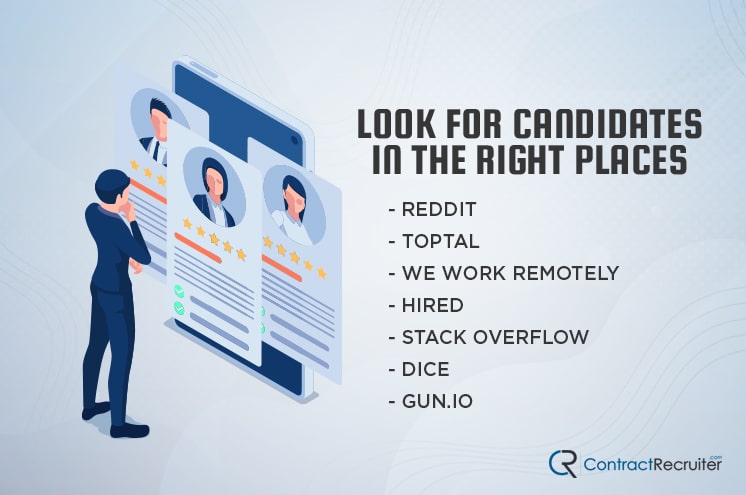Developers are some of the most in-demand people in the workforce today. So much of the world runs on computers, from phone apps to web services to critical infrastructure. Developers are the ones who make those systems. Among the different kinds of developers, front-end developers are responsible for making the parts that everyday people use, so they have to be skilled enough to create a front-end interface that works intuitively and efficiently.
These days, it feels like nearly every company needs front-end developers. Thus, competition for those potential candidates is fierce. More and more companies are turning to strategies like poaching passive candidates rather than cycling through untested developers. How can your company find and hire talented developers without wasting time or money on the search?
Know What You Need in a Developer
Before you can begin to hire a developer, you need to know what you need out of them. Front-end developers have a particular set of skills, usually revolving around HTML, CSS, and JavaScript, but they may also need to know specific programming languages, APIs, JS frameworks like Angular or React, the use of version control systems like Git, browser development and testing tools, and even graphic design, user experience, and user interface best practices.
There’s a wide range of possible skills developers have. The key is knowing what your company specifically needs. Talk to your existing developers, whether they’re back-end or full-stack, and learn what software and skills they would need a front-end developer to have. For example, your developer might not need UX experience if you have a dedicated user experience designer, and they might not need API experience if your app doesn’t use APIs.
It’s also important to divide your needs from your wants. Familiarity with specific apps and programs may not be necessary, but nice to have. Conversely, if the developer doesn’t have familiarity with a critical library or system you need them to be using fluently from day one, make sure that skill is listed on the “must-have” section of your job listing.
It’s a tricky path to walk. On the one hand, you need to keep your list of requirements short, so you have the largest candidate pool possible. On the other hand, you need to be specific with what you require, so you only get the most relevant, most likely to succeed candidates.
Understand What Developers Want from Employers
It’s not enough to know what you need out of a developer; you also need to know what developers want out of you. You could have the lowest bar possible to hire developers and still never get a bite simply because your benefits are too slim.
What benefits do developers tend to want?
- A good salary. You don’t have to offer the best salary – indeed, you probably can’t compete with the likes of Google on that front – but a decent salary, particularly for the candidate’s area, is essential.
- Good insurance coverage. More than ever, people are keenly aware of the need for medical coverage in 2021, so they’re going to demand top-tier insurance coverage, not just for themselves but for their families as well.
- Flexible leave. Whether it’s sick days, flexible time off, maternity (and paternity) leave, or paid time off; developers want competitive and flexible packages.
- Remote work. With the pandemic and the mostly-online and digital nature of development work, there’s very little reason for developers to be crammed into the same office. Partial or fully remote employment is a huge perk you can offer with relatively little expense tied to it, and it’s one of the most important benefits developers look for today.
It’s also important to be flexible with these benefits. If a good developer would rather have remote work than a higher salary, by all means, negotiate with them on their pay and benefits package. Inflexibility turns candidates away.
Consider Freelance Contract-to-Hire
Many of the best developers out there don’t want to be tied down to a single employer, or if they do, they don’t want to take that plunge right away. Often, the best developers are found on freelance sites or operating their own freelancing/consulting businesses.
Thus, one option you have available is to hire freelancers. You can either hire them as they are, with a freelance contract, or you can work out a contract-to-hire deal with them. Hiring freelancers is often more expensive from a pure salary standpoint, but it saves you in benefits and other expenses, so it often evens out.
The downsides are consistency and exclusivity. Freelancers can continue to work with other companies while they work with you, spreading their efforts out. More importantly, if someone comes along with a better offer, they can drop your contract in favor of the other much more readily than an employee can.
Whether this is a risk you want to take or not is a decision you’ll have to make for yourself.
Look for Candidates in the Right Places
In the past, employers held control over the labor market. You may have been able to upload a job listing to Indeed, LinkedIn, or another job site and pull in all the candidates you ever wanted. Today, though, the power has shifted into the hands of the employees. You often need to come to them, find them where they spend their time, and reach out to them on their own terms.
Sites to use include:
- Reddit, in developer subreddits.
- Toptal
- We Work Remotely
- Hired
- Stack Overflow
- Dice
- Gun.io
You can, of course, still use the classics like LinkedIn, your own careers portal, and more general sites like CareerBuilder, Indeed, or Monster. You can also consider working directly with universities with developer programs to hire graduates fresh out of education. This can be a great way to establish an employment pipeline, but it will result in primarily inexperienced developers joining your team.
Look for Passive Candidates
Developers are the kind of employees that usually want a challenge. They get bored easily, and if their day-to-day work is tedious or they feel like it’s no longer challenging their skills, they may start to look for greener pastures. Even those who haven’t reached the point of seeking advancement may be considering the idea of leaving.
Add to this the lack of long-term careers, and you have a recipe for turnover. Employees today often recognize that there’s very little room for serious career advancement within any given organization. Instead, to progress their careers, they need to jump ship and take on a higher-level role with another company.
Thus, you can take advantage of this trend to look for passive candidates with the skills you need, employed in roles at or below where you would have them work. Finding junior developers from other companies and offering them senior developer roles can be a great way to attract talented passive candidates.
“The key to identifying passive job seekers is to be creative. More and more companies are posting videos about what it is like to work there. Others run ads on online radio stations like Pandora because it’s a place where their potential job candidates spend time. Retail companies with in-store Wi-Fi service use it to reach passive job candidates. When customers sign in to access a store’s free Wi-Fi connection, employment messages appear during sign-on that link to the company’s career site. Organizations also have been known to run television advertisements and use billboards and even posters to source passive job seekers.” – SHRM.
One great place to find these candidates is the people who have applied to you in the past, so you know they’re pre-vetted.
Expand Your Search Area
We’ve already mentioned one of the biggest things holding back modern companies. All too often, companies want to have their teams together in the same room or office, believing this fosters productivity and communication. In reality, offices are full of distractions, and teams often don’t work as productively together when they’re all in the same room.
When you offer remote and work-from-home positions, you immediately broaden your available candidate pool. The number of people with the skills you need, willing to work with you, and who live in the same city as you (or are willing to relocate) is a much smaller number than the number of people with the skills you need, willing to work with you, and who can telecommute from anywhere.
The future of work is remote work, and the sooner you can get on board with it, the better. Many successful companies today have mostly or even entirely remote workforces, and that number will only grow in the coming years and decades. The home office may be more common than the corporate office in the future.
Implement Relevant Skills Testing
The use of skills assessments has both pros and cons.
We cover the issue in greater detail here, but to summarize:
- Testing can be an objective way to judge the skills of a candidate.
- Testing is often a cost-effective way of filtering a candidate pool.
- Testing can be automated as part of the hiring process.
- Testing can scare off good candidates who think you’re not confident in them.
- Testing needs to be formulated properly to avoid adverse impact and discrimination.
- Testing needs to be validated by a developer that knows their stuff.
Implementing testing can be a great way to boost your hiring process, especially for a technical role like that of a developer. However, if you’re hiring someone at a higher level for a senior developer role, you may be able to skip the testing phase due to their experience.
Streamline and Accelerate the Hiring Process
The hiring market is more competitive than ever. The longer it takes for you to process an application, contact the candidate, and proceed to the interview process, the more likely they are to have already progressed through those stages with a different company. It’s not uncommon for companies to call their top candidates, only to find in the time it took to call back, they already interviewed and accepted an offer with someone else.
One of the best things you can do, then, is to accelerate your hiring process. Minimize the number of delays and roadblocks, and ensure that as little time as possible passes between communications with the candidate. Any time there’s a delay, make sure to keep the candidate updated.
“Employers that have a slow hiring process do and will continue to lose out on top talent to companies that move quickly. The goal here is not to suggest you should hire the first person that responds to your advertisement. Obviously, that could lead to poor hiring decisions. But once you’ve identified a top performer that’s right for the job and your company, it is essential to move your hiring process along in an expeditious manner.” – Laney Solutions.
A fast hiring process can still be thorough; it just needs to be efficient. Modern tools can help with this, but be cautious in using AI-powered filters and other software without human oversight; they can make poor decisions, and you might otherwise never know.
Work With Recruiters
Recruiters are extremely common in the tech industry. Developers are often used to talking to recruiters, and the best recruiters build lists of both passive and active candidates. These lists include more than just names and contact information; they include locations, required benefits and pay rates, skills profiles, and more. In short, recruiters have all the data you need to find the best candidates because they have a direct line to those candidates.
Whether you’re looking to fill the shoes of a senior developer departing, or you need junior developers to get your new project off the ground, there are skilled developers out there willing to work for you. The trouble lies in finding and vetting them quickly enough to hire them before someone else does.
If you or your company have any questions or concerns regarding finding or hiring front-end developers, please feel free to leave a comment down below, and we’ll get a conversation started. We would love to assist you in your hiring needs.










